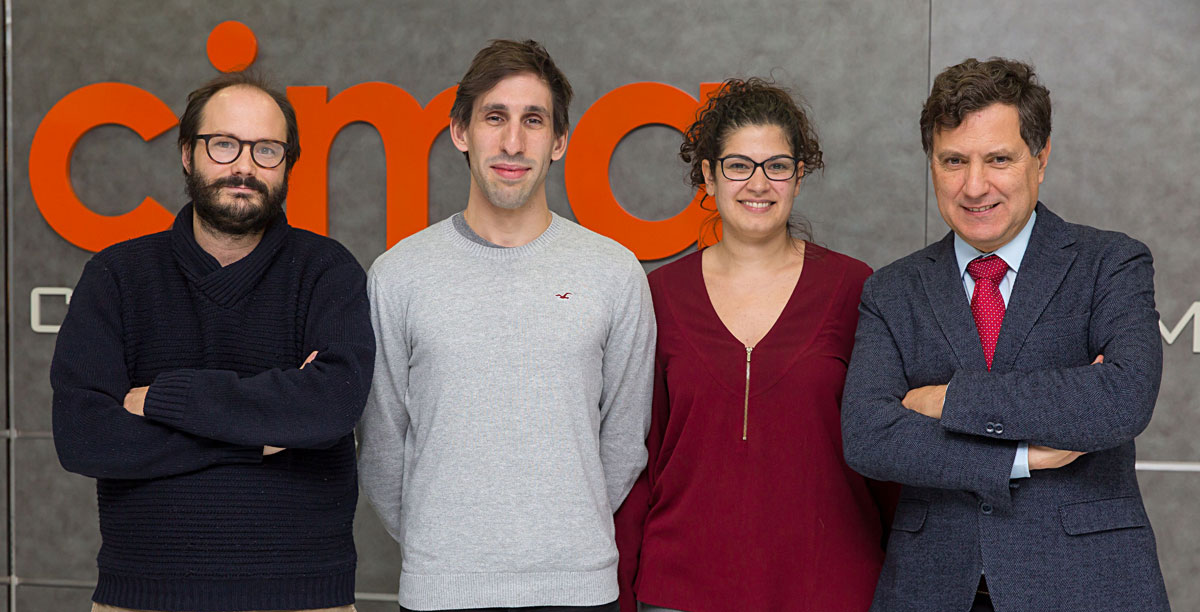Safer immunotherapy compound developed for cancer treatment
Researchers from Cima and Clínica Universidad de Navarra confirm its efficacy without side effects in animal models.

FotoManuelCastells/Dr. Álvaro Teijeira, Iñaki Etxeberria, Elixabet Bolaños and Ignacio Melero, researchers from Cima and Clínica Universidad de Navarra who participated in the study.
30 | 06 | 2021
Researchers from the Cima and the Clínica Universidad de Navarra, at partnership with the pharmaceutical companies Bristol-Myers Squibb and CytomX, have developed a new cancer immunotherapy compound that proves to be effective and safer in animal models than those currently available.
CD137-stimulating antibodies have been known for 25 years to slow tumor progression in mouse models. However, their administration in trials in patients with terminal cancer caused severe cases of liver inflammation, making it necessary to search for new approaches.
In this study, the researchers used an anti-CD137 antibody that is only activated in cancer tissue. "This happens because the antibody has its active site masked by a protein sequence that is degraded by the action of enzymes found almost exclusively in the tumor zone. In this way, the new antibody is only unmasked and exerts its function in malignant tissues but not in healthy organs," explains Dr. Ignacio Melero, researcher senior at Cima, co-director of department of Immunology at Clínica Universidad de Navarra and director of work.
The team of scientists has demonstrated that this anti-CD137 protoantibody (probody) exerts a potent immunotherapy effect against the tumor without causing inflammation in the liver. These findings have been published in the latest issue of the Proceedings of the National Academy of Sciences (PNAS), the official journal of the National Academy of Sciences of the United States.
Advantages of this compound
According to Dr. Melero, "given its safety, this approach makes it possible to combine CD137 stimulation by means of this protoantibody with other immunotherapies already routinely used in the treatment of patients. In fact, we have demonstrated clear synergistic effects with PD-1 receptor antibodies and adoptive cell therapy strategies.
Dr. Iñaki Etxeberria, currently researcher postdoctoral fellow at the high school Memorial Sloan Cancer Center in New York and first author of article, indicates that "perhaps the greatest advantage of these activatable forms of immunotherapy is that they can be applied in less advanced forms of the disease. In fact, we have observed that treatment with this agent has extraordinary efficacy in mice in which we removed the tumors after a few days of treatment with this activatable antibody in the tumor tissue. In particular, we have found that the immune response remains after surgery and is able to completely prevent recurrence in the form of metastasis".
Dr. Melero sample is cautious because, despite the good results, these are still preclinicalprograms of study results. "However, the partnership with these pharmaceutical companies suggests that this technology could soon be applied in clinical trials with patients. In fact, Bristol-Myers Squibb and CytomX collaborate using probodies against other immunotherapy targets such as CTLA-4 and are carrying out clinical trials with them in which several Spanish hospitals are participating, such as Clínica Universidad de Navarra".
reference letter bibliography
-Antitumorefficacy and reduced toxicity using an anti-CD137 Probody therapeutic
